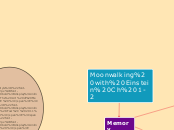av Lydia Ong för 7 årar sedan
329
Moonwalking With Einstein Ch 1-2

av Lydia Ong för 7 årar sedan
329

Mer av detta
When shown faces, people are more likely to remember that the person is a baker rather than their last name is Baker
Knowing someone's profession provides many more neural links than does a proper noun
Scanned brains of London taxi drivers
They had larger right posterior hippocampus, which is involved in spatial navigation
The brain is a mutable organ: neuroplasticity (Foer, 2011, p. 38).
Single-subject study on himself using nonsense syllables produced curve of forgetting
However, mental athletes activated different circuitry during the memorization task: they engaged regions involved with visual memory & spatial navigation
Unable to distinguish between useless & useful material; can't prioritize or generalize; unemployable (Foer, 2011, p. 36).
Trouble understanding abstract concepts & metaphors b/c of all the images (Foer, 2011, p. 33).
"Take the number 1. This is a proud, well-built man; 2 is a high-spirited woman; 3 a gloomy person (why, I don't know); 6 a man with a swollen foot; 7 a man with a mustache; 8 a very stout woman--a sack within a sack"(Foer, 2011, p. 33).